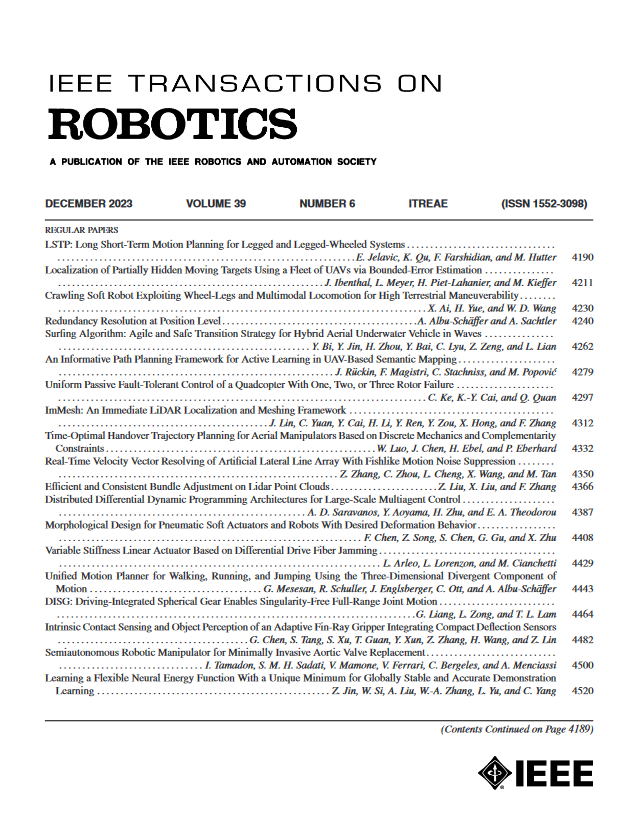Fast Iterative Region Inflation for Computing Large 2-D/3-D Convex Regions of Obstacle-Free Space
IF 9.4
1区 计算机科学
Q1 ROBOTICS
引用次数: 0
Abstract
Convex polytopes have compact representations and exhibit convexity, which makes them suitable for abstracting obstacle-free spaces from various environments. Existing generation methods struggle with balancing high-quality output and efficiency. Moreover, another crucial requirement for convex polytopes to accurately contain certain seed point sets, such as a robot or a front-end path, is proposed in various tasks, which we refer to as manageability. In this article, we propose fast iterative regional inflation (FIRI) to generate high-quality convex polytope while ensuring efficiency and manageability simultaneously. FIRI consists of two iteratively executed submodules: restrictive inflation (RsI) and maximum volume inscribed ellipsoid (MVIE) computation. By explicitly incorporating constraints that include the seed point set, RsI guarantees manageability. Meanwhile, iterative MVIE optimization ensures high-quality result through monotonic volume bound improvement. In terms of efficiency, we design methods tailored to the low-dimensional and multiconstrained nature of both modules, resulting in orders of magnitude improvement compared to generic solvers. Notably, in 2-D MVIE, we present the first linear complexity analytical algorithm for maximum area inscribed ellipse, further enhancing the performance in 2-D cases. Extensive benchmarks conducted against state-of-the-art methods validate the superior performance of FIRI in terms of quality, manageability, and efficiency. Furthermore, various real-world applications showcase the generality and practicality of FIRI. The high-performance code of FIRI will be open-sourced.快速迭代区域膨胀法计算大型二维/三维无障碍物空间凸区域
凸多边形具有紧凑的表示和凸性,这使得它们适合从各种环境中抽象出无障碍空间。现有的发电方法难以平衡高质量的输出和效率。此外,凸多面体精确包含某些种子点集(如机器人或前端路径)的另一个关键要求在各种任务中被提出,我们称之为可管理性。在本文中,我们提出了快速迭代区域膨胀(FIRI)来生成高质量的凸多面体,同时保证了效率和可管理性。FIRI由两个迭代执行的子模块组成:限制性膨胀(RsI)和最大体积内切椭球(MVIE)计算。通过显式地合并包含种子点集的约束,RsI保证了可管理性。同时,迭代式MVIE优化通过单调的体积界改进来保证高质量的结果。在效率方面,我们设计了适合这两个模块的低维和多约束性质的方法,与通用求解器相比,效率提高了几个数量级。值得注意的是,在二维MVIE中,我们提出了第一个用于最大面积内切椭圆的线性复杂度分析算法,进一步提高了二维情况下的性能。针对最先进的方法进行了广泛的基准测试,验证了FIRI在质量、可管理性和效率方面的卓越表现。此外,各种实际应用展示了FIRI的通用性和实用性。FIRI的高性能代码将是开源的。
本文章由计算机程序翻译,如有差异,请以英文原文为准。
求助全文
约1分钟内获得全文
求助全文
来源期刊

IEEE Transactions on Robotics
工程技术-机器人学
CiteScore
14.90
自引率
5.10%
发文量
259
审稿时长
6.0 months
期刊介绍:
The IEEE Transactions on Robotics (T-RO) is dedicated to publishing fundamental papers covering all facets of robotics, drawing on interdisciplinary approaches from computer science, control systems, electrical engineering, mathematics, mechanical engineering, and beyond. From industrial applications to service and personal assistants, surgical operations to space, underwater, and remote exploration, robots and intelligent machines play pivotal roles across various domains, including entertainment, safety, search and rescue, military applications, agriculture, and intelligent vehicles.
Special emphasis is placed on intelligent machines and systems designed for unstructured environments, where a significant portion of the environment remains unknown and beyond direct sensing or control.
 求助内容:
求助内容: 应助结果提醒方式:
应助结果提醒方式:


